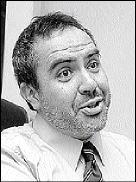Corruption watchdog wants to set up shop in Jamaica
Published: Sunday | September 20, 2009

Salas
TRANSPARENCY International (TI) is seeking to establish a permanent chapter in Jamaica, says regional director for the Americas, Alejandro Salas. The Berlin-based corruption watchdog made initial contacts with local representatives several years ago to this end.
Jamaica scored 3.1 out of a maximum of 10 in TI's 2008 Corruption Prevention Index.
Salas visited the island last week to address a meeting of the National Integrity Action Forum, an initiative of the Centre for Leadership and Governance at the University of the West Indies, Mona. He spoke to Gleaner Special Projects Editor Byron Buckley about the state of corruption in Jamaica and the anti-corruption work of TI globally.
Byron Buckley: What's the purpose of your visit to Jamaica?
Salas: We are here to share with the National Integrity Action Forum lessons from combating corruption in the Americas. However, one purpose of our mission is to start promoting the establishment of a Transparency International chapter in the country ... to have a permanent presence of TI in Jamaica.
What are the steps in establishing a TI chapter?
We approach different organisations or individuals we know or who have been recommended to us. We see if we have a shared or common interest in looking at the problem (of corruption) with similar eyes.
We are not seeking persons who are interested in investigating cases (we are not the police, we are an NGO). What we want to do is to reform structures and processes in institutions. We then determine if they have the time, energies and interest to engage with us in becoming a contact. After working together for some time, an agreement is signed and the TI national chapter is formalised.
We are very advanced because we have found something very interesting ... the National Integrity Action Forum is already a big step forward. It's a forum that gathers civil society, academics and champions of reform within the public sector and also the private sector. In that sense, we have identified this very important group of actors who are already collaborating. I, therefore, think we are way ahead in our identification of potential supporters.
How do you define corruption?
It is the abuse of entrusted power for private gain. That way we can include fraud and nepotism.
How deep is corruption in Jamaica?
So far there is mixed feelings. It is clear that there is corruption, both at the grand level - such as large procurement processes and contributions to political campaigns - there is also a lot of petty corruption. So, there is corruption in Jamaica for sure.
But, at the same time, we have found a very positive context to start working on anti-corruption.
Why isn't Jamaica's efforts to improve its anti-corruption architecture not reflected in the country's rating on the Corruption Perception Index (CPI)?
"You are absolutely right and this doesn't happen with only Jamaica. With this measurement, at first you will get punished because as you start exposing the scope of corruption, and you start engaging the public in debate on the issue of corruption, there is a sense that corruption is growing. So, it takes some time for this perception to start changing, as long as there are results. Of course, if there are no positive responses, then the score won't move.
It's a little unfair in terms of statistics and the way the surveys are done. However, the Corruption Perception Index, which we publish every year, is based on the perceptions of business people and market analysts and this is the perception they have based on the dealings they have with the public sector. So, it's somewhat a qualified opinion that does not cover the whole scope of society. The perception is valid, but it does not reflect what is happening in the entire society or the public administration. The score is not enough; a finer analysis can be done of the (corruption) reality of the country beyond TI's annual score.
How prepared were TI and other international watchdog organisations to uncover the greed and unethical behaviour of the corporate world, which precipitated the near collapse of the global economy?
Transparency International started out by looking at how the countries of the north behaved when they were doing business in the south. That's the origin of TI. As we started growing - getting more chapters - we started diversifying. While we still worked with the corporate sector, issues of corruption in the public sector in the countries also became relevant. So, we are now more active with the public sector. That doesn't mean that we are not looking at the private sector. Definitely, we should do more.
In terms of how the financial crisis surprised us. I have to admit and be sincere from the side of Transparency International that, although we were working with corporations in promoting business ethics and social corporate responsibility, we didn't go deeply into working with the financial sector.
Probably, we were a bit intimidated because you need very technical expertise to be able to understand that sector, and we probably didn't have that. Now that is changing because the crisis has exploded and we cannot turn a blind eye to that. So we are now in dialogue with the relevant actors who can share this expertise and deeper understanding of the financial sector.










